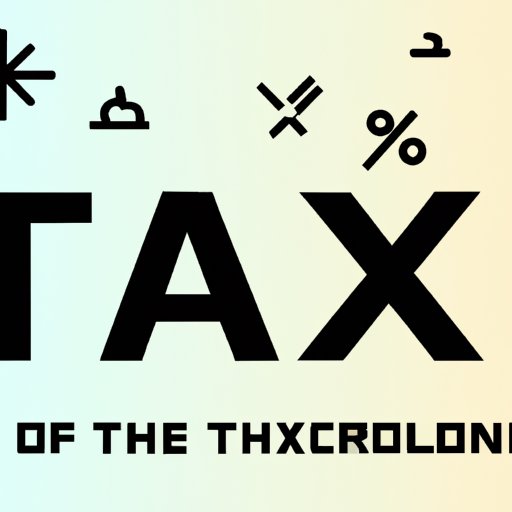Introduction
The world of cryptocurrency is quickly becoming a popular investment option for those looking to diversify their portfolio. With the ever-changing landscape of digital currencies, however, comes a number of questions about taxation. Do I have to file crypto on my taxes? If so, what are the reporting requirements? How do I calculate my taxable income? In this article, we’ll provide an in-depth look at crypto taxes and everything you need to know about filing your returns.
The Basics of Tax Reporting for Crypto Investors
Before delving into the specifics of filing crypto taxes, it’s important to understand the definition of cryptocurrency. Cryptocurrencies are digital or virtual currencies that use cryptography for security. They are decentralized, meaning they are not backed by any government or financial institution. Bitcoin is the most well-known cryptocurrency, but there are many others, such as Ethereum, Litecoin, and Ripple.
In terms of taxation, the Internal Revenue Service (IRS) considers cryptocurrencies to be property, not currency. As such, it is subject to capital gains taxes. That means that any time you sell, exchange, or otherwise dispose of your cryptocurrency holdings, you may be required to report the transaction and pay taxes on any gains.
What Types of Crypto Transactions are Taxable?
The IRS considers any transaction involving cryptocurrency to be taxable. Some examples of taxable events include:
- Selling cryptocurrency for cash or other property
- Trading one cryptocurrency for another
- Using cryptocurrency to purchase goods or services
- Receiving cryptocurrency as payment for goods or services
- Gifting cryptocurrency to another person
How is Taxable Income Calculated?
Any time you engage in a taxable event involving cryptocurrency, you must calculate your taxable income. Taxable income is determined by subtracting your cost basis (what you paid for the cryptocurrency) from the proceeds (what you received from the sale). For example, if you purchased 1 Bitcoin for $10,000 and later sold it for $15,000, your taxable income would be $5,000.
What Are the Tax Rates on Cryptocurrencies?
The amount of tax you owe on your cryptocurrency gains depends on how long you held the asset. Short-term gains (assets held for less than one year) are taxed as ordinary income, while long-term gains (assets held for more than one year) are taxed at a lower rate. The exact rate depends on your tax bracket.

What You Need to Know About Crypto Taxes
Now that you understand the basics of crypto taxes, let’s take a look at the specifics of filing your returns. Here’s what you need to know.
What Forms Should be Filed?
If you engaged in any taxable transactions involving cryptocurrency, you must file Form 8949 with your tax return. This form is used to report all sales and exchanges of capital assets, including cryptocurrency. Additionally, you may need to file Form 1040 Schedule D depending on the amount of capital gains you realized.
What Are the Penalties for Not Filing?
Failure to report cryptocurrency transactions can result in hefty penalties. Depending on the severity of the offense, you could face fines of up to $250,000 and/or up to five years in prison.
What Records Should be Kept?
It’s important to keep detailed records of all your cryptocurrency transactions. This includes purchase dates, sale prices, transaction fees, and any other relevant information. These records will help you accurately calculate your taxable income and ensure you don’t miss any deductions.

How to File Crypto Taxes in 5 Easy Steps
Filing crypto taxes doesn’t have to be complicated. Here’s a step-by-step guide to filing your taxes.
Step 1: Gather Necessary Documents
The first step is to gather all the documents you need to complete your tax return. This includes your bank statements, investment statements, and any other documents related to your cryptocurrency transactions. It’s also important to have your W-2 forms if you received any wages or salaries during the year.
Step 2: Calculate Your Taxable Income
Next, you’ll need to calculate your taxable income. This is done by subtracting your cost basis from the proceeds of each taxable transaction. For example, if you purchased 1 Bitcoin for $10,000 and sold it for $15,000, your taxable income would be $5,000.
Step 3: Complete the Necessary Forms
Once you’ve calculated your taxable income, you’ll need to complete the necessary forms. This includes Form 8949 and, if applicable, Form 1040 Schedule D. Be sure to include all your cryptocurrency transactions on these forms.
Step 4: Submit the Forms
Once you’ve completed the forms, you can submit them to the IRS. You can either mail them or submit them electronically through the IRS website.
Step 5: Keep Records for Future Reference
Finally, it’s important to keep detailed records of all your cryptocurrency transactions. This includes purchase dates, sale prices, transaction fees, and any other relevant information. These records will come in handy if you ever need to prove your transactions to the IRS.

A Guide to Crypto Tax Deductions
One of the benefits of filing your crypto taxes is the potential to deduct certain expenses. Here’s what you need to know.
What Types of Expenses are Allowable?
The IRS allows taxpayers to deduct certain expenses related to their cryptocurrency investments. This includes trading fees, transaction costs, and interest expenses. You may also be able to deduct losses if you sold your cryptocurrency for less than you paid for it.
How to Claim Deductions on Crypto Taxes
If you’re eligible for deductions, you can claim them on your tax return. First, you’ll need to complete Form 8949 and enter your deductions in Part II. Then, you’ll need to transfer the total of your deductions to Line 21 of Form 1040.
Tips for Avoiding Common Crypto Tax Mistakes
Taxes can be complicated, especially when it comes to cryptocurrency. Here are some tips to help you avoid common mistakes.
Knowing When to Report Gains or Losses
It’s important to report any gains or losses from your cryptocurrency investments. Make sure to keep track of when you bought and sold your assets so you can accurately report them on your tax return.
Taking Advantage of Tax Strategies
There are a number of tax strategies available to cryptocurrency investors. For example, you may be able to defer your gains if you reinvest your proceeds into another cryptocurrency. Additionally, you may be able to reduce your taxes by taking advantage of deductions and credits.
Understanding How Exchange Rates Affect Taxation
Exchange rates can have a significant impact on your crypto taxes. If you convert your cryptocurrency into a different currency, you may be subject to foreign exchange gains or losses. Make sure to account for any exchange rate fluctuations when calculating your taxable income.
How to Prepare for Crypto Tax Audits
Though rare, it’s possible that you could be audited by the IRS. Here’s what you need to know.
Understand the Audit Process
The audit process typically involves the IRS requesting additional documentation to verify your reported income. They may also ask questions about your transactions and deductions. It’s important to understand the process so you can prepare accordingly.
Gather and Organize Records
Having detailed records of your cryptocurrency transactions is key to surviving an audit. Make sure you keep all your documents organized and easily accessible. This includes purchase and sale records, transaction fees, and any other information related to your cryptocurrency investments.
Know Your Rights as a Taxpayer
Finally, it’s important to know your rights as a taxpayer. The IRS has specific rules and procedures for audits, and it’s important to understand them so you can protect your rights.
Conclusion
Crypto taxes can be confusing, but understanding the basics is essential for any cryptocurrency investor. Knowing what types of transactions are taxable, how to calculate your taxable income, and how to file your returns can help you stay compliant with the law. Additionally, taking advantage of deductions and understanding how to prepare for an audit can help you minimize your tax burden. By following the tips in this article, you can ensure you’re properly filing your crypto taxes.
(Note: Is this article not meeting your expectations? Do you have knowledge or insights to share? Unlock new opportunities and expand your reach by joining our authors team. Click Registration to join us and share your expertise with our readers.)
